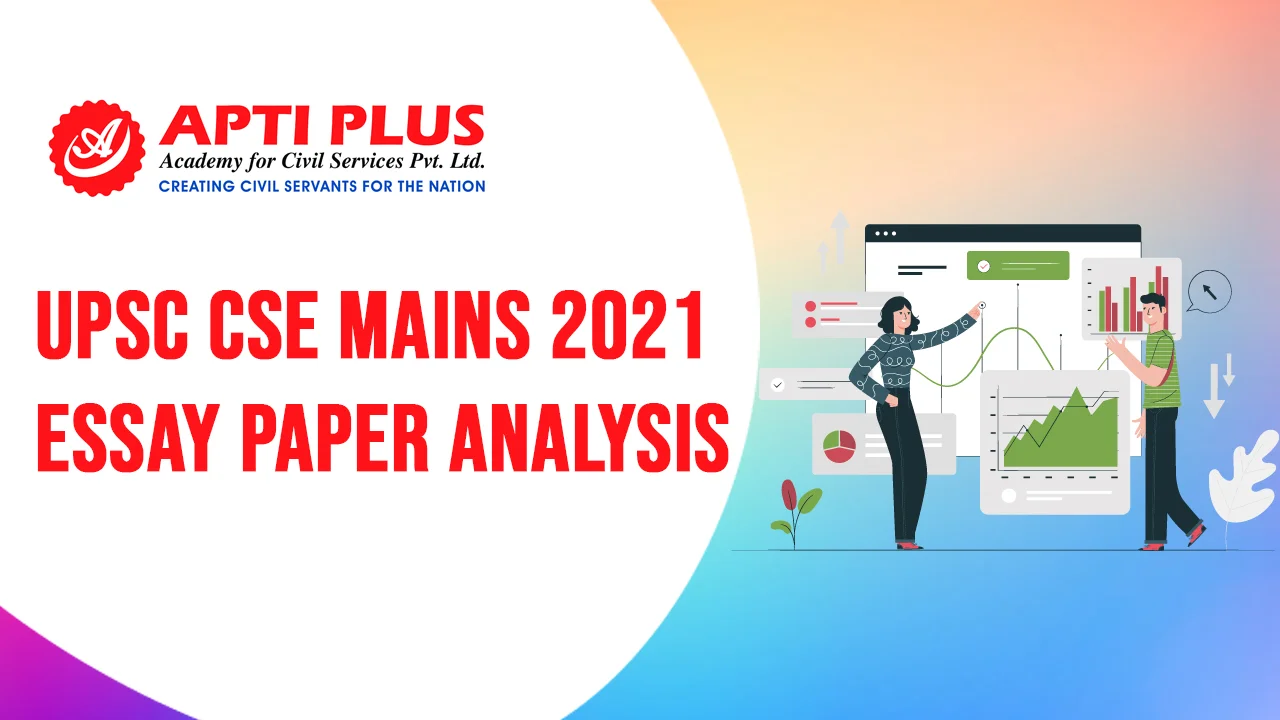Union Public Service Commission (UPSC) on January 7 conducted the first paper of CSE Mains 2021 that is the Essay Paper.
Union Public Service Commission (UPSC) on January 7 conducted the first paper of CSE Mains 2021 that is the Essay Paper.
Essay Paper UPSC 2021 Instructions
- Total Marks: 250 marks, Time duration: 3 hours.
- The essay must be written in the medium authorized in the admission certificate which must be stated clearly on the cover of this question-cum-answer (QCA) booklet in the space provided.
- No marks will be given for answers written in the medium other than the authorized one.
- Word limit, as specified, should be adhered to.
- Any page or portion of the page left blank, must be struck off clearly.
Write two essays, choosing one topic from each of the following Sections A and B, in about 1000-1200 words each:
Section A
- The process of self-discovery has now been technologically outsourced.
- Your perception of me is a reflection of you; my reaction to you is an awareness of me.
- Philosophy of witlessness is Utopian, while materialism is a chimera.
- The real is rational and the rational is real.
Section B
- The hand that rocks the cradle rules the world.
- What is research, but a blind date with knowledge!
- History repeats itself, first as a tragedy, second as a farce.
- There are better practices to “best practices”.
UPSC CSE Main 2021 essay paper analysis
- There has been a trend of the increased number of philosophical essays in the past couple of years however this time around the benchmark was higher than the previous few years. However, considering the philosophical base of the questions, most candidates found the questions tricky. It was not easy to write 1000 words on each topic within the time constraints.
- UPSC has ensured that the essay topics were much different from the GS questions.
- Rather than asking candidates to write on topics most aspirants are familiar or trained with, UPSC is now evaluating the essay writing skills of aspirants by providing them with abstract or philosophical topics.
- All the topics presented this year will test the spontaneous thinking, comprehension, writing skills, and time-management of aspirants.
- Repeated questions from previous years
- Topics required broad interpretation
- Themes asked:
- challenges of science and technology
- philosophy optional: ’Real is rational and the rational is real’ is a repeated question from the previous year philosophy optional paper.
- vulnerable section: women equality, empowerment, etc.
- Learn from the past as well as to provide for a better future.
- Research
It is necessary to know why an essay paper is required in a competitive exam?
UPSC notification says that “candidates may be required to write essays on multiple topics. They will be expected to keep close to the subject of the essay, arrange their ideas in an orderly fashion, and to write concisely. Credit will be given for effective and exact expression.”
What can one make out of this? The following quote of Abraham Lincoln very aptly answers the question…..
‘Writing’ (essay) of the aspirant works as a window, for the highly experienced examiner, to the thought process of the candidate. Examiner will not only evaluate the content of the aspirant but also his thought process, viewpoints on critical matters, clarity in thinking, ability to explain his viewpoint concisely and effectively, the ability of coherence and putting his ideas in an orderly fashion, language. In a nutshell, it acts as a means to bring out the traits of a potential civil servant and to evaluate if he is fit to be one.
Having discussed the importance of the paper, it is essential to clear the misconceptions associated with the essay paper before moving to how to prepare for it.
- There is no preparation required for essay paper-GS and optional knowledge will suffice.
Truth. This is a wrong way of thinking. In GS marks will be awarded just for content. But in the essay, the examiner will pay attention to more than the content as explained above.
- One needs to be a champion in English-use technical jargon, vocabulary.
Truth. It is worth noting that in UPSC CSE, the simpler the language the better it is. There is no need for flowery jargon and expressions.
- There is no difference between a language paper essay and an ‘Essay’ paper.
Truth. This is a highly misconceived notion on the part of aspirants to treat the essay paper just like essays asked in the language papers. The importance of both is vastly different. One is aimed to judge the language of the aspirant whereas the other is aimed to bring out the true traits of a potential Civil Servant.
- Essay paper can’t be prepared so easily.
Truth. This is again a misconception. There have been candidates who have drastically increased their marks from scores like 100-110 to 150-160 with proper strategy and preparation. It is worth noting that essay paper requires relatively lesser effort to improve as compared to GS papers. The rate of investment is quite high.
From where to prepare for the essay paper?
- GS and optional preparation will give content.
- Reading non-fiction: will help to develop a thinking process.
- Anecdotes, stories, quotes, facts, and figures: A separate notebook should be kept for the same.
- Referring to magazines: Yojana, Kurukshetra, EPW, Economic Survey, DowntoEarth.
- Newspaper editorials, relevant lines said by eminent/constitutional posts like President, PM, etc.
- Essay transcripts of previous year toppers.
How to prepare for the essay?
- Firstly read the transcripts of previous year toppers to get a feel of what comprises a well-written essay.
- A separate notebook for an essay should be prepared where fodder collected from the above-mentioned sources should be written in point format.
- An aspirant should prepare material on all the general topics that have been asked in the exam previously. This should include quotations, facts/ figures, anecdotes, sayings, case studies, government schemes.
- Whenever an aspirant takes a particular topic, he should try to think of all the possible themes/ dimensions of it. For eg: Consider the topic “With great power, comes great responsibility”. Aspirant can think of the topic from SPECLIH perspective- Social, Political, Economic, Cultural, Legal, International and Humanistic. This is one way of covering multiple dimensions.
- Read different kinds of essays – particularly philosophical essays. Give stress to the thoughts of philosophers like Immanuel Kant, Thomas Aquinas, John Locke, Friedrich Niche, Karl Marx, etc.
- The next step is to write essays. Pick up the previous year’s papers and practice them at home in exam conditions. Self-evaluate and get feedback from mentors, peers, and teachers.
How to approach an essay?
- Aspirants should have a clear-cut plan ready for attempting the essay paper. It should be clear in his mind before entering the examination hall how he is going to manage the time. The answers to the following questions should be ready beforehand.
- How much time will be devoted to choosing the topic?
- How much time will be devoted to interpreting the topic?
- How much time will be devoted to making a rough skeleton of the essay?
- How much time will be devoted to attempting the essay?
- How much time will be devoted to revising and underlining the keywords?
- Aspirants should always keep a buffer of 10 minutes in order to meet any exigency.
Eg: Topic Selection: 5 minutes, Brainstorming: 10-15 minutes, writing: 1 hour, revision: 5 minutes.
- The first thing is choosing the right topic from each section. This will depend upon the aspirant’s holistic understanding of the topic. Do not get swayed by the fact that since it is an easy topic I won’t choose it. I will choose an unconventional topic just to impress the examiner. This is the wrong way of thinking.
- Next thing is to interpret the topic. One should understand the theme of the topic. THE MOST IMPORTANT THING ABOUT ESSAY WRITING IS PROPER UNDERSTANDING OF THE TOPIC AND “WRITING ON THAT TOPIC”. DOING THIS MUCH ENSURES THAT ONE WILL NOT GET BELOW-AVERAGE MARKS.
- Brainstorm and prepare the skeleton of the topic:
- Every essay should have an introduction, body, and conclusion.
- Introduction: this can be a fictitious story, real-life anecdote, quote, a paragraph on what is going to be covered in the essay.
- Themes/ dimensions to be covered eg: SPECLIH, temporal, sectoral, walks of life, problem and solution format.
- Quotes, sayings, anecdotes, facts/ figures.
- Keywords.
- Conclusion: it should always be on a futuristic and optimistic note. Summarize the essay in 4 to 5 lines and then write the vision for the future. Some saying, quote, lines of eminent personalities can be used.
- Structuring of the essay:
- Language should be simple and clear
- Keep the sentences short and powerful
- Occasional use of powerful words or jargon can give the essay an edge
- Proper subheadings
- Transition smoothly from one para to the next through a link sentence/ through a question
What to avoid in the essay?
- Aspirants should never give one-sided arguments or viewpoints which are against the constitutional spirit.
- Never focus excessively on only one dimension or theme.
- Always write what is asked not what one knows.
- Do not give a disproportionate amount of time to one essay avoiding the other one.
- Avoid criticizing the government, its policies, and its schemes.
- Avoid being seen as a person belonging to a particular ideology.
- Avoid writing in bullets, making diagrams, figures, charts. The essay should always be in continuous para format.
It is often seen that aspirants do not give the necessary attention to the essay paper. They spend months preparing for the optional and the GS papers but hardly give dedicated time to essay papers. This leads them to score poorly in the exam and they fail to get the edge that they could have easily achieved with a proper strategy and preparation for the essay paper. If one compares GS papers score with that of essay one can find out that it is difficult to achieve a score of 120-125 marks in the former whereas aspirants touch 150 and even 160 in the essay paper which gives them an edge of almost 30 marks. CSE topper 2017 scored just 100 marks in the essay paper of CSE 2015 whereas after making the necessary effort and rectifying his mistakes he was able to score 155 in CSE 2017.
Courses Offered By APTIPLUS (Best IAS Coaching in Kolkata)
Offline Classes Fees For IAS/UPSC Coaching in Kolkata & Bhubneshwar:-
Course Name |
Duration |
Fees |
| General Studies Prelims-cum Mains + Essay + CSAT+ Mock Tests 2023 | 10-12 months | 1,30,000 (Both Online & Offline) |
| NCERT COURSE | 02 Months | 35,400/- |
| Optional Course (Sociology, Geography, Public Administration, Political Science & International Relations.) | 03 Months | 35,400/- |
| Prelims Test Series 2023 (total 60 tests & 12 month’s subscription of IAS GAZETTE) | 365 Day’s | Online Tests-Rs. 7,900/- & Offline Tests- Rs. 9,999/- |
| Mains Test Series (Covering 14 tests) | 365 Day’s | Rs. 18,000/- |
| Mock Interview Programme
|
After Mains Result | Free DAF analysis and interview material for the selected Candidates. |





